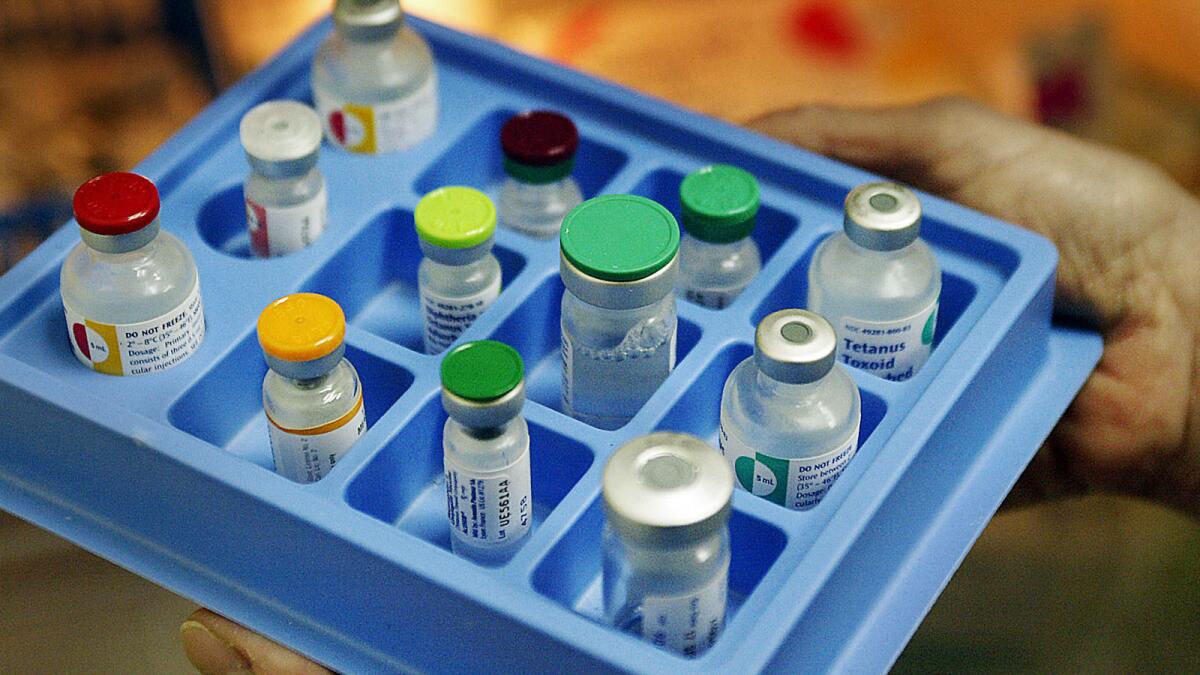Editorial: Hey, anti-vaxxers, are you ready to get your shots yet?

The person credited with saving the most lives ever is Edward Jenner, inventor of the smallpox vaccine. The disease had a much higher mortality rate than the novel coronavirus that is confining many people to their homes right now; about 80% of children and 60% of adults who contracted smallpox died of it. In the 20th century alone, it killed more than 300 million people before the vaccine eradicated it worldwide in 1979.
The polio vaccine is estimated to have saved 10 million people from paralysis just since 1988, and prevented 500,000 deaths, according to the World Health Organization. A global vaccination campaign for measles that began in 2000 prevented an estimated 23 million deaths by 2018, the organization reported.
But despite these extraordinary victories of science over disease, too many people have forgotten or are unaware of the havoc that certain diseases visited on the world before vaccines became available to fight them. This collective amnesia has allowed for the rise of the anti-vaccine movement, whose irresponsible adherents believe vaccines exist to line the pockets of Big Pharma. They ignore the fact that the smallpox vaccine was so overwhelmingly successful at eradicating the disease that it no longer is routinely given. Then there are the wild claims that autism is linked to vaccines, based on a fraudulent study that was long ago debunked.
Are anti-vaxxers ready to start believing in vaccines again?
As social distancing and other efforts to rein in the spread of COVID-19 are ramped up, people are understandably hoping for an Edward Jenner-like miracle in the form of a vaccine that would protect against the virus. When a scourge is upon us, immunization starts looking pretty good.
There’s encouraging news on this score, and discouraging news as well. This week, people have seen what seems like a bright promise in the darkness: a volunteer in Seattle receiving the first dose of an experimental vaccine against the novel coronavirus. It was developed by a Massachusetts company called Moderna, one of dozens of companies searching for a vaccine across the world. Israeli officials recently announced that a group of research scientists there were on the verge of offering a new vaccine candidate, as well. A San Diego biotech company is also working on the problem.
The speed of development has been made possible in part through the help of Chinese scientists who worked on sequencing the genetic material of the virus that causes COVID-19. But as fast as all this sounds, don’t expect a coronavirus vaccine clinic to be opening near you anytime soon. Despite the claims of the anti-vaccine crowd that vaccines aren’t tested thoroughly enough before coming to market, they actually go through a longer and tougher process than most other drugs. Without fast-tracking, it usually takes 10 to 15 years for them to gain final approval in the United States.
The experimental vaccine injected this week isn’t being tested for effectiveness yet; it’s in the first phase of testing, which looks only at its safety for humans. At least two more phases generally follow; they look at whether a vaccine works and what the optimal dose levels are, in addition to continuing to check for safety. It’s worth noting that many proposed vaccines never make it all the way to approval; what looks promising at first often proves disappointing when subjected to thorough testing.
In urgent situations, vaccines can be fast-tracked, but fast is a relative term. Public health officials have warned that even if these first vaccines continue to look good, a fast-tracked vaccine won’t be available for 18 months, perhaps a little bit sooner. And the vaccine approach used by Moderna, using genetic material called messenger RNA, has not in the past resulted in any vaccine being brought to market, although that doesn’t mean it couldn’t work.
Even in dire situations, testing is critical. An ineffective vaccine could do more harm than good by giving people the false impression that they’re protected. But the United States and governments around the world should be supporting these vaccine-development efforts in every way possible, and fast-tracking those that appear safe and effective.
COVID-19 is upending our lives and our economy; of course we want a vaccine to stop it in its tracks as soon as possible. But come the time when — may it only happen — vaccines have rendered COVID-19 just a memory, it’s frightening to think that future generations who did not live through it may think of the vaccine as more problematic than the disease.
More to Read
A cure for the common opinion
Get thought-provoking perspectives with our weekly newsletter.
You may occasionally receive promotional content from the Los Angeles Times.










